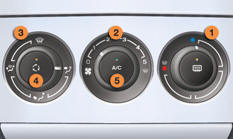Manual air conditioning

The heating / ventilation or air conditioning systems can only operate with the engine running.
1. Temperature adjustment
 Turn the dial from blue (cold) to
red (hot) to adjust the temperature to your requirements.
Turn the dial from blue (cold) to
red (hot) to adjust the temperature to your requirements.
2. Air flow adjustment
 Turn the dial from position 1 to
position 5 to obtain a comfortable air flow.
Turn the dial from position 1 to
position 5 to obtain a comfortable air flow.
 If you place the air flow control
in position 0 (deactivation of the system), the temperature is no longer maintained
at a comfortable level. However, a slight flow of air, due to the movement of the
vehicle, can still be felt.
If you place the air flow control
in position 0 (deactivation of the system), the temperature is no longer maintained
at a comfortable level. However, a slight flow of air, due to the movement of the
vehicle, can still be felt.
3. Air distribution adjustment
 Windscreen and side windows.
Windscreen and side windows.
 Windscreen, side windows and footwells.
Windscreen, side windows and footwells.
 Footwells.
Footwells.
 Central and side vents.
Central and side vents.
 The air distribution can be adapted
by placing the dial in an intermediate position.
The air distribution can be adapted
by placing the dial in an intermediate position.
4. Air intake / Air recirculation
The intake of exterior air prevents the formation of mist on the windscreen and side windows.
The recirculation of interior air isolates the passenger compartment from exterior odours and smoke.
Return to exterior air intake as soon as possible to prevent deterioration of the the air quality and the formation of mist.

Press the button to recirculate the interior air. The indicator lamp comes on to confirm this.
Press the button again to permit the intake of exterior air. The indicator lamp switches off to confirm this.
5. Air conditioning On / Off
 The air conditioning is designed
to operate effectively in all seasons, with the windows closed.
The air conditioning is designed
to operate effectively in all seasons, with the windows closed.
It enables you to:
- lower the temperature, in summer,
- increase the effectiveness of the demisting in winter, above 3 °C.
Switching on
Press the "A/C" button, the button's indicator lamp comes on.
 The air conditioning does not
operate when the air flow adjustment control 2 is in position " 0 ".
The air conditioning does not
operate when the air flow adjustment control 2 is in position " 0 ".
To obtain cooled air more quickly, you can use recirculation of interior air for a few moments. Then return to fresh air intake.
Switching off
Press the "A/C" button again, the button's indicator lamp goes off.
Switching off may affect comfort levels (humidity, condensation).
See also:
Hill start assist
System which keeps your vehicle immobilised temporarily (approximately 2 seconds)
when starting on a gradient, the time it takes to move your foot from the brake
pedal to the accelerator pedal.
T ...
Changing a wheel (308 saloon)
Procedure for changing a faulty wheel for the spare wheel using the tools provided
with the vehicle.
Access to the tools
The tools are installed in the boot under the floor.
To gain access to ...
1.6 litre e-hdi fa p 112 bhp engine
To deploy this technology on a large scale, the new Peugeot 308 proposes
e-HDi technology with a "basic" engine, the 1.6 litre HDi FAP 112 bhp, which can
be coupled with two gearboxes (m ...






